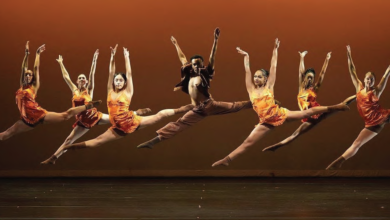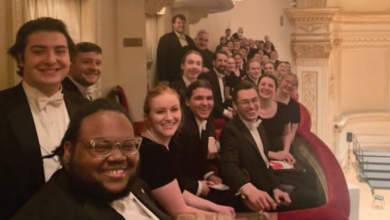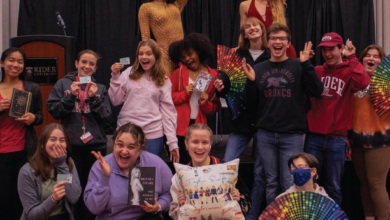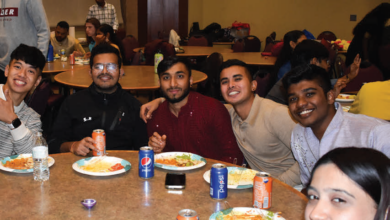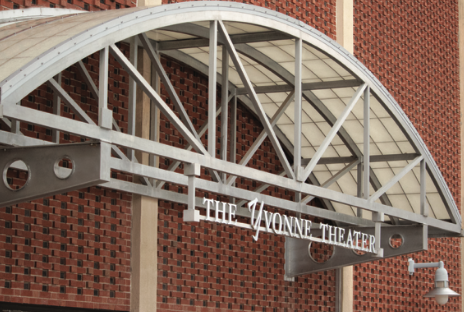
The show must go on, even in an pandemic
By Amethyst Martinez
With the everchanging COVID-19 pandemic, college students across the world have been affected by the virus and its impact on their college experience. But the pandemic especially impacted performing arts students due to the nature of their majors.
Sophomore Avery Gallagher, a musical theater major, remembers the struggles of adjusting to online classes last fall.
“I spent my first semester of college at home and completed my ballet classes in my kitchen and voice lessons in my basement,” said Gallagher.
Gallagher’s experience was the reality for a majority of performing art students last school year due to the pandemic.
Performing arts relies heavily upon in-person interaction, which led to both students and professors having to be creative and find new ways to teach and learn without the classroom, as well as performing without the stage. Many of the classes and performances instead took place on Zoom and Jitsi, both video conferencing websites.
Sean McCarther, associate professor and director of graduate studies at Westminster Choir College, taught all of his classes synchronously.
“I was actually surprised by how effective it could be. No question, it was a different experience, but I saw growth in all my students” said McCarther in an email to the Rider News.
For Gallagher, she found voice lessons were more productive in an online setting. Gallagher said, “It allowed for growth even without physically being in the room together as most of the teachers can hear the issues of technique through the Zoom audios.”
Both professors and students were able to create a space virtually that did not replicate in- person learning, but instead created a completely new way of learning that will be used for many years to come.
McCarther said, “The 18 months of quarantine have forced artists to search for new ways and new platforms through which to perform. I do not think those are going to disappear once we finally emerge from all of this.”
Gallagher moved on campus her spring semester to hopefully improve her college experience.
“It was incredibly hard trying to find a creative spark when all the live theater was shut down and I felt isolated being home all day doing class. … I felt like I was missing out significantly from seeing what my friends on campus were doing so I decided to live on campus [for the] second semester,” she said.
With Gallagher on campus for her spring semester, she then had to adjust to learning on campus with classes that were still mostly synchronous. Gallagher said, “Living on campus and doing musical theater classes within COVID protocol was a whole new ball game.”
For her dance class specifically, Gallagher said, “There were taped squares over Marley flooring covers placed in the second section of the Student Recreation Center gym that several musical theater and dance majors used as socially distanced spaces to take their dance classes.”
This year, with Rider’s less restrictive COVID-19 protocols, musical theater and performing arts are expected to be much different compared to last. Gallagher said, “I think this year, with less restrictive guidelines, everybody will be able to grow to their fullest potential and gain a more filled and exciting experience of what it is to be a musical theater student in college.”
The guidelines are under Rider’s protocols and students will all be asked to wear masks regardless of vaccination status. McCarther said “Across the Westminster College of the Arts, this includes performance-based classes as well as rehearsals. … It is a balance: how do we create the best learning environment that empowers our students to do good work while ensuring the safety of our students, faculty and staff.”
Even though all students will be masked, classes being held in person will allow for some normalcy to return to their learning experiences.
McCarther said, “This year, the College of the Arts is committed to as much in-person learning as safety will allow. Clearly, in the performing arts, so much of what we do happens in the space between people, whether that is between scene partners on stage, between a singer and the pianist, or between a performer and the audience. That has been difficult to replicate via Zoom.”
Despite some restrictions still in place, it is still an upgrade from last year. Gallagher said, “This is a drastic improvement in accessibility from the strict and harsh COVID guidelines of last year.”
The school year will be filled with more in-person activities that many performing art students are looking forward to. “I cannot wait to walk into the new year with fewer restrictions, in-person classes and live theater,” said Gallagher
Although COVID-19 has been a struggle for everyone, musical theater students and professors have figured out how to continue the college experience regardless of barriers presented due to the pandemic.
McCarther said, “Art needs to evolve and mutate to stay relevant and to meet the needs of today’s society. I’m excited to see how our field changes in the next few years.”
